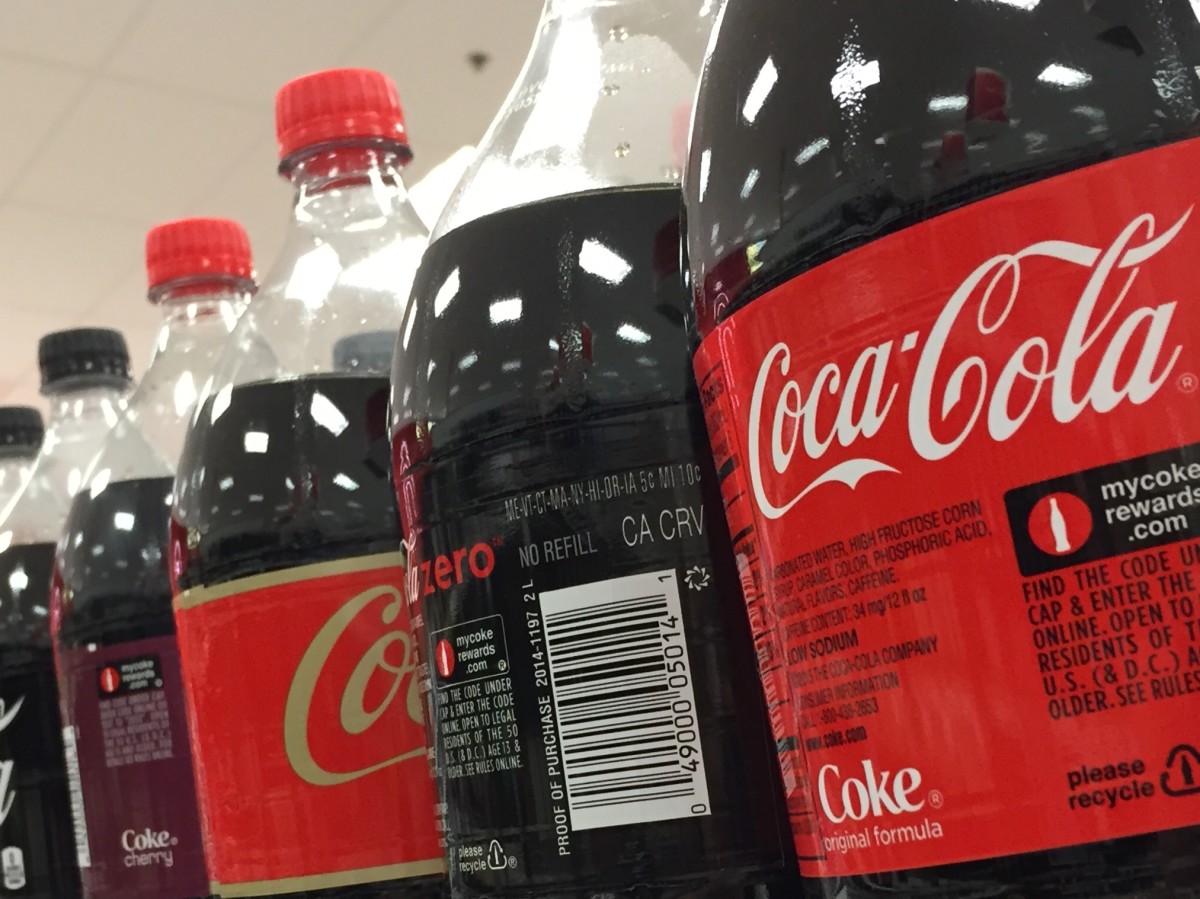Coke Nutrition Label: One can of Coca-Cola contains 140 calories, 39 grams of carbohydrates, and 39 grams of sugars per 12-ounce can.
Coca-Cola is one of the most popular soft drinks in the world. The drink’s sweet, bubbly taste and refreshing qualities have made it a favorite for many people. However, there has been growing concern about the health risks associated with consuming sugary drinks like coke.
This has prompted many to seek out the nutritional information for coca-cola. The nutrition label on a can of coke outlines all the necessary details one would need to make an informed decision about whether or not to consume the drink. This includes information about calories, carbohydrates, sugars, and other important nutrients. In this article, we’ll take a closer look at the coke nutrition label and what it tells us about this popular drink.

Credit: discover.hubpages.com
Understanding The Coca Cola Nutrition Label: What Do The Numbers Mean?
Whether you’re a soda enthusiast or not, you’ve most likely come across a nutrition label before. Coca-cola, like most other products, is required to display its nutritional information on its label. However, it’s not always clear what those numbers actually mean.
So, let’s break them down!
Breaking Down The Servings And Serving Sizes
- A serving of coca-cola is 12 fluid ounces (355 milliliters), and a single bottle typically contains one serving.
- The nutrition label shows both the number of servings in the container and the serving size.
- Be aware that some coke products may have a different serving size and multiple servings per container.
Carbohydrates, Calories, And Sugars: What The Numbers Represent

- Calories: Coca-cola contains calories, which provide your body with energy. A single serving of coca-cola (12 fl oz) contains 140 calories.
- Carbohydrates: Carbohydrates are the body’s primary source of energy. The coca-cola nutrition label lists the total amount of carbohydrates in each serving, including sugar, which is a simple carbohydrate. A single serving of coca-cola (12 fl oz) contains 39 grams of carbohydrates.
- Sugars: The coca-cola nutrition label also lists the amount of sugar in each serving. Sugars are one type of carbohydrate, and a single serving of coca-cola (12 fl oz) contains 39 grams of sugar.
Understanding the nutrition label of coca-cola is simply a matter of knowing what each number represents. Be sure to always read the label carefully and keep in mind the serving size and servings per container to make informed choices about what you put in your body.
Unveiling The Truth Behind Coca-Cola Ingredients List
Coca-Cola Nutrition Label: Unveiling The Truth Behind Coke’S Ingredients
If you’re a fan of coca-cola, you’ve probably read its nutrition label at least once, and with good reason. People are concerned about what they consume, especially when it comes to sugary soda. Coke’s ingredients list is not the easiest to decode, but let’s take a closer look at what’s in your beverage and how it affects your body.
What’S In Your Beverage: Deciphering Coke’S Ingredients
Coca-cola’s ingredients list is long and includes some surprising components:
- Carbonated water
- High fructose corn syrup
- Caramel color
- Phosphoric acid
- Natural flavors
- Caffeine
Most people are aware of the first two ingredients, but what about the others? The following points will help to decode the list:
- Caramel color: Despite its name, caramel color has no nutritional value and is used solely for its appearance.
- Phosphoric acid: This is responsible for the “tingly” sensation when you drink Coca-Cola. It is used to preserve the drink’s shelf life, but it can also cause dental erosion if consumed frequently.
- Natural flavors: These aren’t as natural as you might think. The term “natural flavors” can refer to any substance derived from a plant or animal source, and it doesn’t necessarily mean that the ingredient is healthier for you.
- Caffeine: This well-known stimulant is a mainstay in many sodas. It can lead to dehydration, which is why it’s always a good idea to drink plenty of water with your sugary beverage.
How Do These Ingredients Affect Your Body?
Now that we’ve deciphered coke’s ingredients, let’s look at what happens when you consume this popular drink:
- High fructose corn syrup: Consuming high amounts of this ingredient can lead to obesity, type 2 diabetes, and other health-related issues.
- Phosphoric acid: This can cause dental erosion over time if consumed frequently.
- Caffeine: While caffeine can give you an energy boost, it can also dehydrate you. Drinking water alongside coke can help to counteract this effect.
Coca-Cola nutrition label might be difficult to decipher, but with careful examination, one can determine what’s in their beverage and how it affects the body. It’s important to consume coke in moderation and be aware of the possible health risks that come with high consumption.
The Relationship Between Coca-Cola And Health Concerns
Coke Nutrition Label
Coca-cola is one of the most popular beverages in the world. It is an iconic product that has been around for decades, providing millions of people with a refreshing and delicious taste. However, as with any other food or drink, people are concerned about the nutritional content, especially when it comes to coke.
In this blog post, we will explore the relationship between coke and health concerns, specifically focusing on obesity, diabetes, and heart disease.
Is Coca-Cola Linked To Obesity?
One of the most significant health concerns associated with coke is obesity. While coke alone may not be the sole cause of obesity, it still plays a significant role in contributing to this epidemic. Here are some key points to keep in mind:
- Coke is high in calories and sugar, increasing the risk of gaining weight and becoming obese.
- The sheer amount of sugar in coke can lead to quick blood sugar spikes and subsequent crashes, leading to hunger and overeating.
- Drinking coke is linked to an increase in belly fat, which is associated with an increased risk of diabetes and heart disease.
Given these facts, it’s no surprise that many health experts recommend limiting or even avoiding coke altogether to maintain a healthy weight.
Coke And Diabetes: What Is The Connection?
Another significant health concern associated with coke is diabetes. Here are some key points to keep in mind:
- Coca-Cola contains a large amount of sugar, which can lead to insulin resistance and ultimately type 2 diabetes.
- Even diet coke, which is sugar-free, contains artificial sweeteners that have been linked to an increased risk of developing diabetes.
- People who drink coke regularly have a higher risk of developing type 2 diabetes than those who do not.
Given the connection between coke and diabetes, it is crucial to limit or avoid this drink to lower the risk of developing this chronic condition.
Coke And Heart Disease: Separating Fact From Fiction
Many people believe that drinking coke leads to an increased risk of heart disease. However, the relationship between coke and heart disease is slightly more complicated than that. Here are some key points to keep in mind:
- While coke does not directly cause heart disease, it can contribute to other factors that do. For example, obesity, diabetes, and high blood pressure are all risk factors for heart disease, and drinking coke can increase the risk of these conditions.
- The caffeine in coke can raise blood pressure temporarily, but this effect is relatively small and short-lived.
- Some research suggests that drinking one or two servings of coke per day may not increase the risk of heart disease significantly.
While Coca-Cola alone may not cause heart disease, drinking it regularly can contribute to other factors that do increase the risk of this condition. Consider limiting your coke intake and reaching for healthier beverage options instead.
As the popularity of coke continues to rise, it’s essential to keep in mind the impact it can have on your health. By understanding the relationship between coke and health concerns like obesity, diabetes, and heart disease, you can make informed choices about your beverage options and prioritize your health in the long run.
Coke Alternatives: Exploring Healthier Drink Options
A Healthier Choice: Comparing The Nutritional Value Of Soda To Other Drinks
Soda may be a favored drink for many people, but it’s no secret that it’s loaded with sugar and empty calories that are not compatible with maintaining a healthy lifestyle. Here are some alternatives to coke that are healthy and nutritious:
- Water is always the best option. It’s refreshing, calorie-free, and helps to keep us hydrated. For an extra boost of flavor, adding fresh fruit is a great way to make drinking water more enjoyable.
- Unsweetened iced tea has a delicious flavor and is a great alternative to sugar-laden soda. Adding a slice of lemon or a dash of honey can enhance the taste without adding too many calories.
- Coconut water is a natural drink that’s low in calories and hydrating. It’s high in potassium, magnesium, calcium, and vitamins b and c.
- Vegetable juices are a great way to get your daily dose of vitamins. Try blending a mixture of veggies like carrots, beets, kale or spinach, and ginger for a nutrient-rich drink.
- Low-fat milk is a nutritious drink that’s a great source of calcium and vitamin d, as well as muscle-building proteins.
Natural And Low-Calorie Alternative Beverages
Apart from the above alternatives, there are natural and low-calorie beverages that can be consumed for better health. Here are some of them:
- Kombucha is a fermented tea that can be sweet or tart. It’s packed with probiotics that help improve digestion and boost the immune system.
- Sparkling water is refreshing, hydrating, and available in several flavors. It’s a great alternative to soda because it’s calorie-free and has no added sugar.
- Green tea is one of the healthiest drinks available. It contains antioxidants that help reduce inflammation, regulate blood sugar and boost metabolism.
- Fruit smoothies made with fresh or frozen fruit are an excellent way to get your daily dose of fiber and vitamins. They are low in calories and can be customized to suit individual tastes.
Do They Live Up To Their Health Claims?
While these alternative drinks are healthier than soda, it’s essential to keep in mind that they still contain calories. It’s important to practice moderation and drink these beverages in conjunction with a healthy diet and regular exercise. Additionally, avoid fruit juices that often contain added sugars and preservatives.
Switching to these healthier alternatives to soda is a great way to reduce the number of calories and sugar consumed daily. These drinks also provide a host of nutrients that are beneficial to overall health. Remember to choose the best drinks that fit into your lifestyle, and enjoy them in moderation for better health.
Making Sense Of It All: Should You Still Drink Coke?
Coca-Cola Nutrition Label
For many people, coke is a drink of choice. But one question that always comes up is, “should i still drink it? ” In this blog post, we’ll take a closer look at the coke nutrition label to help you make an informed decision.
Balancing Indulgence And Nutrition: Understanding Moderation
Coca-Cola is undoubtedly a treat, but how much is too much? Here are some things to consider when trying to balance indulgence and nutrition:
- Coca-Cola is high in sugar and calories, so it’s best to consume it in moderation as part of a balanced diet.
- Instead of drinking a full can or bottle, consider limiting yourself to half or a quarter.
- To help minimize the effects of coke on your teeth, try drinking it with a straw to reduce direct contact.
The Bottom Line: Can Coca-Cola Be Part Of A Healthy Lifestyle?
It’s natural to wonder whether coke can be part of a healthy lifestyle. Here are some key points to keep in mind:
- If you’re looking to lose weight or maintain a healthy weight, drinking coke regularly is not recommended.
- Drinking coke can contribute to an increased risk of type 2 diabetes and other health problems.
- If you do choose to drink coke, opt for the smaller serving sizes.
As you can see, coke can be enjoyed in moderation, but it’s important to keep an eye on your total sugar and calorie intake. By being mindful of your overall diet and lifestyle choices, you can make an informed decision about whether or not to drink coke.
Frequently Asked Questions Of Coke Nutrition Label
Is Coca-Cola Nutritious?
Coke is a carbonated soft drink that contains calories , sugar, and caffeine but lacks essential nutrients. It shouldn’t be considered nutritious.
How Much Sugar Is In A Can Of Coca-Cola?
One twelve-ounce can of coca-cola contains 39 grams of sugar, equivalent to about 10 teaspoons. This amount of sugar is higher than the recommended daily sugar intake limit.
Does Coke Have Caffeine?
Yes, coke contains caffeine. A 12-ounce can of coke has around 35 mg of caffeine. But caffeine content might vary in different coca-cola products.
How Many Calories Are In Coke?
A 12-ounce can of coke has 140 calories. However, the number of calories may vary a little depending on the product variety or the brand.
What Are The Ingredients In Coke?
The main ingredients of coca-cola are carbonated water, sugar, caramel color, phosphoric acid, natural flavors, and caffeine. However, the actual ingredients list may vary depending on the country or region.
Conclusion
Understanding the nutrition label on coca-cola products can have a significant impact on our health and wellness. While it is widely accepted that coke is a sugary beverage, the specific information on the nutrition label can reveal just how much sugar and calories we are consuming.
By being mindful of portion sizes and limiting our intake of sugary drinks, we can make better choices for our bodies. Furthermore, understanding what each ingredient listed on the label means can help us make informed decisions about what we put into our bodies.
As with any food or drink, moderation is key, and being aware of the nutrition facts is the first step towards a healthier lifestyle. So the next time you reach for a coke, take a look at the nutrition label and make a conscious choice for your health.




